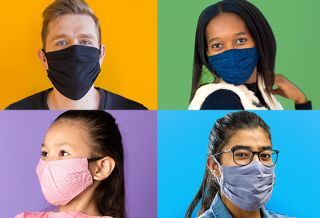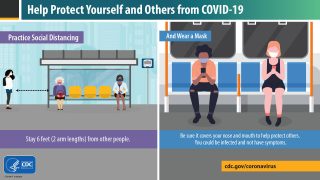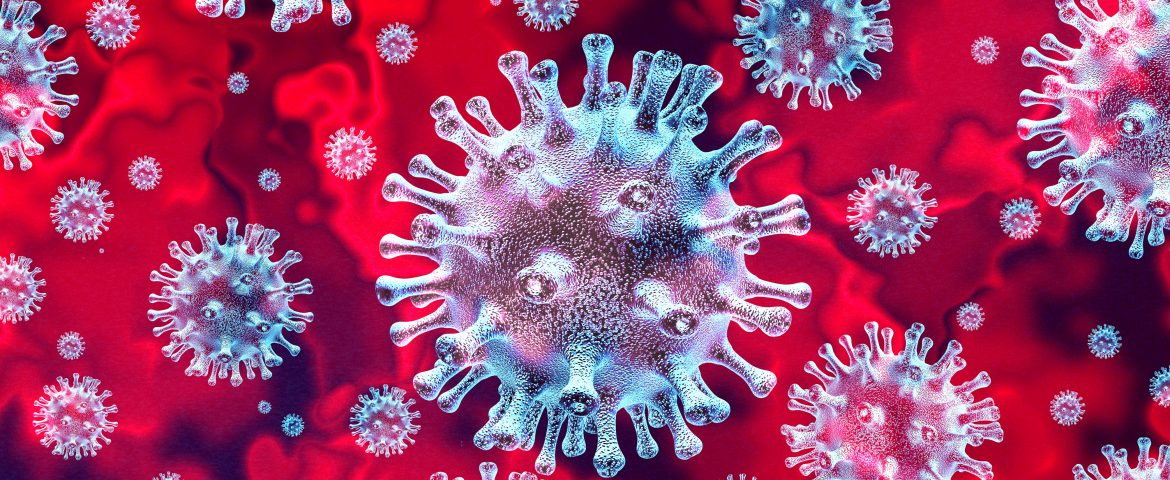What is COVID-19?
According to the Centers for Disease Control and Prevention (CDC), Coronavirus disease 2019 (COVID-19) is a respiratory illness that can spread from person to person. The virus that causes COVID-19 is a novel coronavirus, or SARS-CoV-2, that was first identified in early 2020 in Wuhan, China. This flu-like illness is very serious, with confirmed cases and deaths in the U.S. and Michigan rising.
Symptoms
The signs and symptoms of COVID-19 vary, but over the course of the disease, most people with COVID-19 experience one or more of the following:
- Fever or chills
- Cough
- Shortness of breath or difficulty breathing
- Fatigue
- Muscle or body aches
- Headache
- New loss of taste or smell
- Congestion or runny nose
- Nausea or vomiting
- Diarrhea
According to the CDC, these symptoms may appear 2-14 days after exposure.
How is COVID-19 transmitted?
According to the CDC, the virus that causes COVID-19 is thought to spread mainly from person-to-person.
- Between people who are in close contact with one another (within about 6 feet).
- Through respiratory droplets produced when an infected person coughs or sneezes.
These droplets can land in the mouths or noses of people who are nearby or possibly be inhaled into the lungs. Face masks or face coverings can help reduce the spread of COVID-19. Learn more here.
Risk factors
Similar to influenza (the flu), people at a serious risk for developing COVID-19 are those who suffer from chronic disease and weakened immune systems. Older adults are also at a more serious risk. However, COVID-19 has had fatal effects on all age groups and precautions should be taken by all.
Prevention
 To reduce risk, health experts recommend practicing the following everyday actions, along with social distancing (CDC recommendations here) for community locations.
To reduce risk, health experts recommend practicing the following everyday actions, along with social distancing (CDC recommendations here) for community locations.
- Wash hands with soap and water frequently for at least 20 seconds. If soap and water are not available, use an alcohol-based hand sanitizer with at least 60% alcohol.
- Clean and disinfect any surfaces you frequently touch.
- Always cover your nose and mouth when sneezing or coughing with a tissue, then throw the tissue away and wash your hands.
- Stay home when you’re feeling sick.
- Avoid close contact of any kind with anyone who is sick.
- Avoid touching your eyes, nose and mouth.
The CDC recommendations include the use of face masks while in public settings when social distancing is difficult to maintain (e.g., grocery stores), especially in areas of high community-based transmission. Learn more about masks and face coverings from the CDC.
Vaccinations
The Pfizer vaccine for COVID-19, named Comirnaty, received full approval from the U.S. Food and Drug Administration on August 23, 2021. Moderna received emergency use authorization in December 2020 from the U.S. Food and Drug Administration (FDA) to immunize people against the COVID-19 virus, and a third vaccine from Johnson & Johnson was given emergency use authorization in late February 2021. On May 10, 2021, the FDA expanded the use of the Pfizer vaccine for individuals ages 12-15. It was also recently approved for children ages 5 to 11. These vaccines have been proven to be safe and effective for preventing COVID-19 infections and serious symptoms/hospitalizations. State and local health departments are working diligently with health care systems to distribute the vaccines to all eligible Michigan residents.
The FDA and CDC recommended a pause to the Johnson & Johnson vaccine distribution on April 13, 2021 due to reports of a rare but severe type of blood clot. COVID-19 vaccine safety is a top priority for the federal government and all reports of health problems following COVID-19 vaccination are taken very seriously. Following a thorough safety review, the FDA and CDC announced April 23 that the recommended pause regarding the use of the Johnson & Johnson (Janssen) COVID-19 Vaccine in the U.S. should be lifted and use of the vaccine should resume.
Learn more about the different vaccines (including those currently in clinical trials) from the CDC here.
The vaccine distribution plan in Michigan is being managed by MDHHS, local health departments and health care systems statewide. Available vaccines were rolled out in phases statewide, starting with health care workers and residents of long-term care facilities.
All Michigan residents ages 5 and up are eligible to be vaccinated and should do so as soon as possible.
Learn more by contacting your local health department, or at one of these links:
- Statewide information: MDHHS Vaccine Distribution and FAQs
- CDC COVID-19 Vaccine Information and FAQs
- FDA COVID-19 Vaccine Information
Testing
Check with your health plan about coverage for COVID-19 testing. Some plans require it to be ordered by a doctor or other health care provider, and deemed medically necessary. If you’re a Priority Health member, see a list of FAQs here about what your plan will cover for COVID-19 testing and treatment. This FAQs page is regularly updated with the latest information for members.
Not a Priority Health member? There are many locations throughout Michigan offering COVID-19 testing options without a doctor’s order or an appointment, including drive-up options. Find a testing site near you here.
Virtual care for treatment
 Virtual care is recommended by health experts as the best option for minor symptoms. Virtual care allows you to see a certified doctor without having to leave home, and is an alternative to urgent care or the ER. Both urgent care and ER locations can become crowded during peak illness periods and are generally more expensive per visit, depending on your health plan. Virtual care is also a good way to help prevent the spread of infections like COVID-19 and the flu. Check with your doctor’s office or health insurance provider to see what program they offer for virtual care.
Virtual care is recommended by health experts as the best option for minor symptoms. Virtual care allows you to see a certified doctor without having to leave home, and is an alternative to urgent care or the ER. Both urgent care and ER locations can become crowded during peak illness periods and are generally more expensive per visit, depending on your health plan. Virtual care is also a good way to help prevent the spread of infections like COVID-19 and the flu. Check with your doctor’s office or health insurance provider to see what program they offer for virtual care.
Cost share for treatment
Check with your health plan provider to learn more about the cost of treatment for COVID-19.
Medications and supplies
It is recommended you have a thermometer at home to check your temperature and acetaminophen (Tylenol) to control fever or help with pain and muscle aches. Other helpful items to have on hand include clean masks, tissues for covering your mouth when coughing, soap or sanitizer for frequent handwashing, and cleaning supplies for disinfecting.
Mental health support
Self-care and coping skills are critical to your mental health and wellbeing. Priority Health has partnered with a digital health specialist to offer members free access to mental wellness resources specifically focused on the COVID-19 pandemic. Learn more here.
Travel
 The CDC and the World Health Organization (WHO) are monitoring global travel and updating restrictions daily. See a list of destinations with travel notices here.
The CDC and the World Health Organization (WHO) are monitoring global travel and updating restrictions daily. See a list of destinations with travel notices here.
Wondering if you should cancel an upcoming trip or unsure if you should travel at all right now? These FAQs can help. You can also search the CDC map of travel alerts and recommendations by destination here.
Beware of scams
Multiple governmental agencies including the Federal Trade Commission (FTC), Department of Health and Human Services – Office of Inspector General (HHS-OIG) and the Michigan Attorney General have issued warnings to make sure consumers are aware of scammers are taking advantage of fears surrounding COVID-19.
Here are things you should know in case scammers try contacting you for personal information or money to get the vaccine. Remember: vaccines are covered at no cost to you.
- You can’t pay to put your name on a list to get the vaccine.
- You can’t pay to get early access to a vaccine.
- Don’t share your personal or financial information if someone calls, texts, or emails you promising access to the vaccine for a fee.
 Where to go for more information
Where to go for more information
Michigan health experts say the best source for the most updated information about COVID-19 is MDHHS and the CDC.
Michigan impact: COVID-19 timeline 2020-2021
- March 10: the first confirmed COVID-19 cases in Michigan were announced. Governor Whitmer declared a state of emergency closing all K-12 schools.
- March 13: President Trump announced a national state of emergency for additional resources and funding.
- March 23: Governor Whitmer signed an Executive Order directing all non-critical businesses to temporarily close and all Michiganders to stay home or 6 feet away from others. The order was effective as of March 24 and was extended several times with some lifted restrictions for retailers and businesses.
- April 2: Governor Whitmer signed an Executive Order to close all K-12 schools through the end of the 2019-20 school year.
- April 24: an Executive Order opened additional outdoor activity such as motorized boating, golfing and gardening centers with face masks required in close public spaces. (CDC guidelines for masks, including how to make your own.)
- May 21: Governor Whitmer announced allowing additional activities including small gatherings of groups of 10 or less effective immediately with social distancing and continuing to wear masks in close spaces. This included nonessential medical, dental and veterinary procedures.
- June 1: Governor Whitmer lifted the stay-at-home order with several restrictions still in place, with face masks and social distancing still required in close public spaces.
- June 5: the Governor announced that hair salons, barber shops and other personal services, such as nail salons, could reopen throughout the state. In northern Michigan, with fewer cases of COVID-19, indoor social gatherings, movie theaters, gyms and outdoor sporting venues were allowed to open with limited capacity/social distancing, and face masks still required in close public spaces.
- July 10: due to rising cases statewide, the Governor signed an Executive Order requiring masks in all indoor public spaces and in crowded outdoor spaces with a willful violation of the order as a misdemeanor subject to a $500 criminal penalty (no jail time). Businesses were required to refuse entry to those not wearing masks. Some exceptions were included.
- July 29: due to a rise in cases from social gatherings, the Governor issued two new Executive Orders limiting statewide gatherings to 10 people and ordering bars across the state that earn more than 70% of their gross receipts from alcohol sales to shut down indoor bar services effective July 31. Casinos were allowed to open with limited capacity.
- September 3: Governor Whitmer signed an Executive Order reopening Michigan’s gyms and pools, and allowing for organized sports practices and competitions to resume in regions where they remained restricted, subject to strict protections.
- October 2: The Michigan Supreme Court ruled to strike down Governor Whitmer’s emergency Executive Orders.
- October 5: The Michigan Department of Health and Human Services (MDHHS) issued an Emergency Order restricting gathering sizes, requiring face coverings in public spaces and placing limitations on bars and other venues.
- October 9: MDHHS issues updated COVID-19 regulations that mirror Governor Whitmer’s emergency Executive Orders the Michigan Supreme Court struck down.
- October 12: The Michigan Supreme Court again ruled to strike down emergency executive orders Governor Whitmer issued under the Emergency Powers of Governor Act. But new emergency orders issued through the state health department — which replicate mask requirements, restrictions on gathering sizes and restaurant capacity, among other features — are not affected by the ruling. The MDHHS orders require masks at any public gathering with two or more people — including sporting events and schools — for much of the state and maintains restrictions on the number of people who may enter stores or restaurants.
- November 15: The MDHHS issued a new Epidemic Order limiting indoor gatherings, closing restaurants and bars for dine-in service, moving high schools and colleges/universities to 100% remote learning and more. The order, effective November 18 at 12:01 a.m., is set to last for three weeks through December 8.
- December 7: The MDHHS extended the order through December 20.
- December 18: The MDHHS extended the order again through January 15.
- January 13, 2021: The MDHHS extended the order with some additional openings (indoor fitness classes and non-contact sports) through January 31.
- January 22: The MDHHS extended the order with some additional openings (indoor dining to resume with restrictions February 1).
- February 4: The MDHHS extended the order with contact sports allowed to resume as of February 8.
- March 17: The MDHHS extended the order with additional guidelines for gatherings and businesses.
- April 5: all Michigan residents 16 years of age and older are eligible to receive the COVID-19 vaccine and many locations statewide are beginning to offer walk-in appointments.
- May 12: Michigan residents ages 12-15 are eligible to receive the Pfizer vaccine.
- May 13: Governor Whitmer announces lifting the mask mandate for all fully vaccinated people effective May 14 at 9 a.m. She also announced that the mask mandate for all residents, regardless of vaccination status, will be lifted on July 1.
*Plans can vary. Please contact Priority Health customer service if you have questions about your coverage.
**Priority Health will also work with self-insured groups who determine their own benefit coverage for their employees and dependents to explore coverage options.


